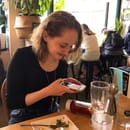We’ve all been there, the moment when you bang your head against a wall (or a desk, table, etc.) in a desperate attempt to shake loose any form of creativity. Whether it be for a school project, professional piece, or just for fun, sometimes you get the itch to make something but have no idea what to do. Although we may blame a lack of inspiration, motivation, or talent, oftentimes it’s subconscious bad habits that get in our way. So here’s a few tips on how to overcome your mental blocks and start creating pieces you’ll be proud of:
- Seek Inspiration
-
Don’t feel like you have to produce a completely original idea with absolutely no help in order to get started. There’s nothing wrong with using a reference or participating in a “draw this in your style” (DTIYS) challenge when creating art. I usually use Pinterest or Instagram when trying to find photos to use for inspiration. Utilizing Youtube or Spotify playlists can also be useful when trying to decide what mood you want your project to have. These playlists also come in handy when looking up soundtracks for videos or deciding what movies and/or shows to include if you make fandom edits. Don’t be afraid to look into different mediums when trying to come up with ideas. I use a lot of tattoos and/or photographs as sketch references. Sometimes you can use photos to create writing prompts or inspire settings in your writing. Technology has provided us with plenty of resources, and we shouldn’t be afraid to use them. Plenty of famous writers and artists were inspired by nature, so taking a walk or just sitting outside can help clear your head and open you up to new possibilities.
- Switch Genres
-
If something’s just not working, but you still love your concept, try switching genres or mediums. In order to strengthen my skills, I often rotate between drawing, writing, and screenwriting. With each medium comes different types of presentation, ranging from descriptive language to concise dialogue to absolutely no words at all. Music involves the auditory aspect of storytelling without any visual at all. Sometimes you’ll find that you’re approaching a great idea from the wrong angle. Dialogue isn’t working in a script? Try describing the setting like you would in a book or drawing what you imagine the characters doing while they’re talking. Maybe try writing the score that would be playing over that specific scene. Even if you don’t end up using that other piece, it could provide insight into your characters or point you in a different direction. Sometimes you need to try generating different content. If you usually produce dark content, try creating something related to comedy. Don’t feel like you have to stick to a certain style. Gaining a fresh perspective can do wonders for your work.
- Start Small
-
Don’t feel like you have to produce a full-fledged masterpiece in one sitting in order to be productive. Every book starts with a simple line. Every painting starts with a single stroke. Every film starts with an initial frame. You don’t need a jolt of divine inspiration in order to begin a project. The most important part of creating something is simply getting started. You’d be amazed at how many times I’ve sat down at my laptop feeling uninspired and ended up finishing a rough draft not long after I’d begun (if you exclude the Youtube bingeing every hour or so). Maybe you don’t feel like painting a full-color portrait. Try using only a pen or a pencil and make a simple sketch. Have the beginning and the ending of a story mapped out in your head? Focus on making those scenes as vivid as possible. What’s important is creating something that you’re proud of, regardless of whether it’s a grand concerto or an opening verse.
- Stay Open-Minded
-
Oftentimes, when we finally come up with an idea, we can often get stuck there. As creatives, we pour our hearts into our work, which makes it even harder to receive constructive criticism. Don’t be afraid to switch things around when it comes to cleaning up areas of your work. Maybe a scene doesn’t work in a particular story but can become a crucial aspect of a future one. Perhaps you need to rearrange the order of events or the point-of-view in order to truly convey a character’s personality. It’s okay to change up your original idea in order to fulfill a more complete understanding of the project at hand. If nothing seems to be working, take a quick break or set it aside and come back to it the next day with a fresh set of eyes. It’s amazing how many pieces of a puzzle can go together after you take out a few that don’t fit quite right.
- Stop Nitpicking
-
That being said, we often get in our own way when it comes to completing a project due to unnecessary nitpicking. Editing as you write can trap you in a specific section, stuck in a never-ending cycle of revision. Worry about getting the general idea down before going over it. This also applies when it comes to video editing, drawing, songwriting, or any other form of creative expression. It’s important to get down the general idea of what you want first before diving into the details. Having a vague sense of what you want to accomplish can prevent wandering down rabbit trails while also leaving room for improvisation. And remember, just because something doesn’t live up to the expectations you formed in your mind while working on a project doesn’t mean that it’s not worthy of being shared. Your audience doesn’t have the same mindset as you and may not even notice the slight mistake you’ve been agonizing over for days. The best thing you can do to grow and learn as an artist is to put your work out there and be receptive to everyone’s opinions.
We’ve all fallen into a creative rut at some point in our lives. The main piece of advice that many famous artists give is to just make things, regardless of whether you’re feeling inspired or not. Don’t worry about it being extremely complex or even fully finished. As long as the content is true to the message you’re trying to convey, be proud of what you produce.



